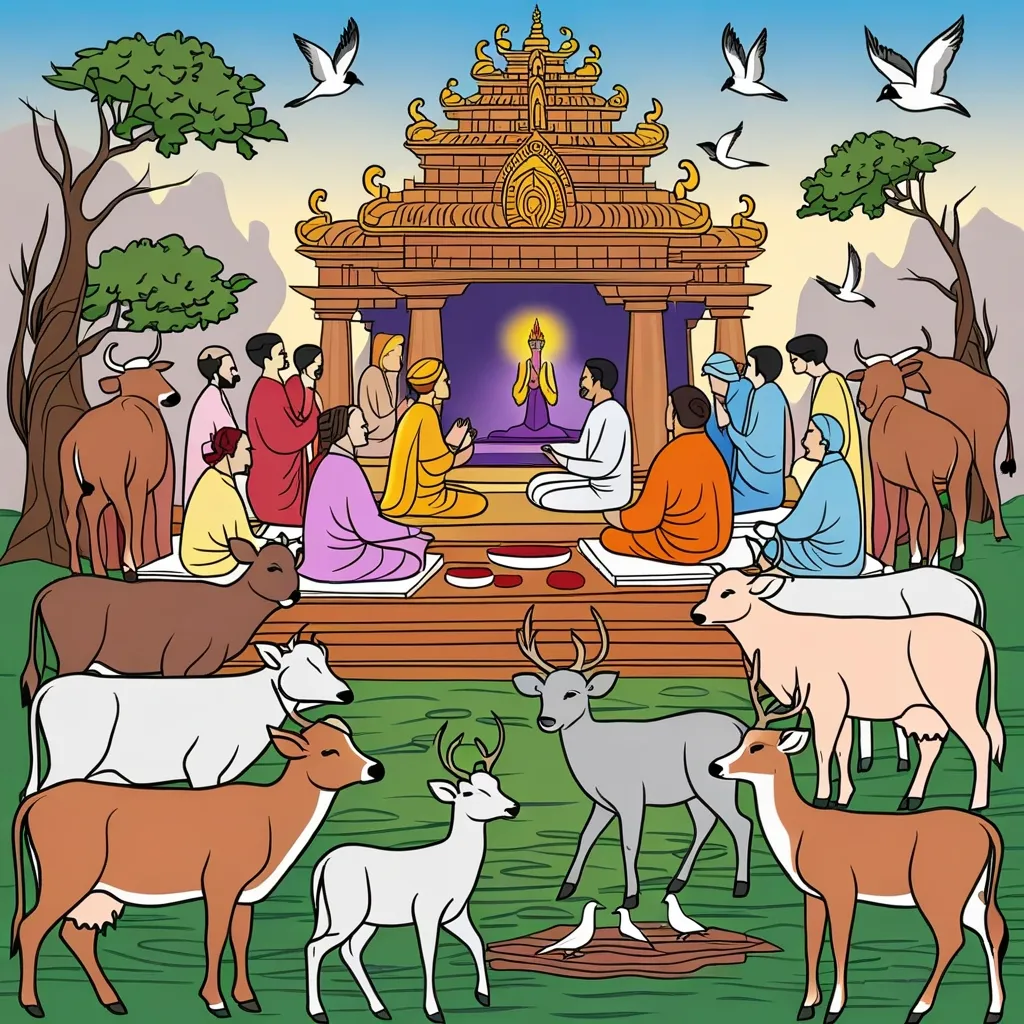In the hustle and bustle of modern life, it’s easy to lose sight of what truly matters: living in harmony with ourselves, our communities, and the natural world. The Vedas, ancient texts from India, offer a wealth of wisdom on how to achieve this balance. Let’s delve into five Vedic approaches that can guide us toward a more harmonious way of living.
Aligning with Cosmic Order: The Concept of Rta
Imagine waking up each morning in sync with the sun, and retiring with the stars. This is the essence of Rta, a Vedic principle that encourages us to live in alignment with the natural order of the universe. By observing the rhythms of nature, we can adapt our lifestyles to promote overall well-being. Rta is not just about following a routine; it’s about being in tune with the cosmos.
“As the sun sets, so too must we set aside our daily worries and find peace in the stillness of the night,” I often remind myself. This simple act of synchronization can bring a sense of calm and purpose to our lives.
Ethical Guidelines: Yama and Niyama
Yama and Niyama are ethical guidelines that form the bedrock of Vedic living. These principles include non-violence, truthfulness, contentment, and self-discipline. By adhering to these guidelines, we foster personal integrity and social harmony.
“Non-violence is the highest religion,” as Mahatma Gandhi once said. This philosophy extends beyond physical harm to include emotional and mental well-being. Practicing non-violence in our daily interactions can create a ripple effect of kindness and compassion.
Balanced Nutrition: The Concept of Ahara
The Vedic approach to nutrition is holistic, considering not just the physical aspects of food but also its energetic qualities. Ahara, or balanced nutrition, emphasizes the consumption of whole, natural foods that are in season and locally available. This approach avoids the chemicals, preservatives, and additives found in processed products, giving our bodies pure and balanced nutrition.
“Let food be thy medicine and medicine be thy food,” Hippocrates wisely advised. By choosing foods that are in harmony with nature, we can improve our digestion, reduce stress, and enhance our overall health.
Global Understanding: Vasudhaiva Kutumbakam
The concept of Vasudhaiva Kutumbakam, or “the world is one family,” fosters global understanding and cooperation. This perspective encourages us to see beyond our individual and national boundaries, recognizing that we are all part of a larger family.
“We are all in the gutter, but some of us are looking at the stars,” Oscar Wilde once said. By looking beyond our immediate surroundings and seeing the world as one interconnected family, we can cultivate empathy, compassion, and a deeper sense of unity.
Selfless Action: The Practice of Karma Yoga
Karma Yoga, the practice of selfless action, is a powerful Vedic approach to finding purpose and contentment in daily activities. By performing our duties without attachment to results, we can experience inner peace and contribute positively to society.
“The best way to find yourself is to lose yourself in the service of others,” Mahatma Gandhi said. When we focus on the process rather than the outcome, we find a sense of fulfillment that goes beyond personal achievements.
Living Mindfully
Mindfulness is a core principle of the Vedic lifestyle. It involves being aware of every action, whether it’s eating, working, or relaxing. Practices like yoga, meditation, and mindful eating encourage a deeper connection with ourselves, helping to reduce stress and bring peace to the mind.
“Mindfulness is the practice of being fully present and engaged in the current moment, while cultivating a non-judgmental awareness of one’s experiences,” as Jon Kabat-Zinn defined it. By living mindfully, we can improve our mental clarity, emotional stability, and overall sense of well-being.
Respecting Nature
Vedic teachings emphasize a respectful relationship with nature. This includes avoiding harmful chemicals in farming practices and treating animals with care. The quality of our food and our environment depends on the purity of its source.
“The earth has music for those who listen,” William Shakespeare wrote. By respecting nature, we cultivate an environment that is sustainable and beneficial for all.
Physical Activity and Well-being
Regular physical activity is another key component of the Vedic lifestyle. Practices like walking, yoga, or gentle exercises not only benefit the body but also refresh the mind, contributing to a sense of well-being and vitality.
“Yoga is the journey of the self, through the self, to the self,” the Bhagavad Gita says. Yoga promotes flexibility, strength, and mental balance, making it a valuable practice for anyone pursuing the Vedic way of life.
The Benefits of a Vedic Lifestyle
Adopting the Vedic lifestyle can lead to numerous benefits, from better digestion and mental clarity to increased energy levels and a higher quality of life. By focusing on natural, unprocessed foods, living mindfully, and respecting nature, we can reduce stress and improve our overall health.
“Health is not valued until sickness comes,” as Thomas Fuller once said. By incorporating Vedic practices into our daily lives, we can prevent many health issues and live a more balanced, fulfilling life.
A Call to Action
As we reflect on these Vedic approaches, we might ask ourselves: How can we apply these principles in our modern lives? How can we align our daily routines with the natural order of the universe? How can we make more mindful choices about what we eat and how we interact with others?
“The future belongs to those who believe in the beauty of their dreams,” Eleanor Roosevelt said. By embracing the timeless wisdom of the Vedas, we can create a future that is more harmonious, balanced, and fulfilling for all.
In conclusion, the Vedas offer us a rich tapestry of wisdom for living in harmony with ourselves, our communities, and the natural world. By adopting these Vedic approaches, we can find balance, purpose, and contentment in our daily lives, even in the midst of a fast-paced and often chaotic world. So, let us take the first step today, and see where this journey of harmonious living takes us.






